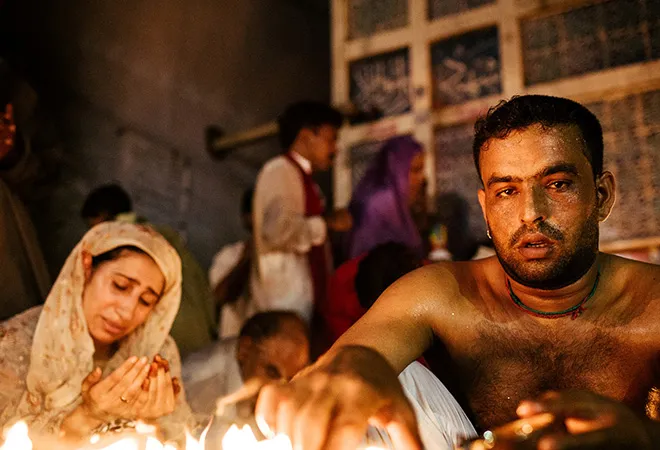-
CENTRES
Progammes & Centres
Location
With two years to go for the next Lok Sabha election, PM Modi's opponents were beginning to make their moves. Demonetisation was only a catalyst.

One month into demonetisation, much has been said about and read into what it means for the government and for Prime Minister Narendra Modi. What has it thrown up for the opposition? To be honest, the demonetisation exercise is only a prism through which to watch key individuals in the opposition. With two years to go for the next Lok Sabha election, Modi's opponents were beginning to make their moves anyway. Demonetisation was only a catalyst.
In Congress, this period has seen the all, but ascension of Rahul Gandhi. He is not party president yet but is clearly more visible in Parliament and in negotiations with other opposition groups. It can be argued this doesn't mean much. When you have the Congress president-in-waiting standing next to a second-rung leader of a regional party at a protest meeting, it makes for a photo-op and conveys a message Congress would rather avoid.
Frankly, Congress doesn't have the luxury of options. It is going to approach 2019 as it did 2004, with the idea of building a coalition of parties outside the Modi umbrella. The difference is in 2004 Sonia Gandhi did the legwork and in the run-up to 2019 the onus is on Rahul. Sonia's absence from the frontline in recent days, whether for reasons of health or as a deliberate strategy to give her son space, has indicated a transition, for whatever it is worth.
When will Rahul Gandhi officially be anointed president? The party is in a predicament as it wants to shield its new leader from the fiasco of a poor election in Uttar Pradesh — where even senior Congress functionaries have given up on denting BJP's urban and Brahmin vote — but bring him into the limelight in case Congress wins Punjab. Ironically the latter may have more to do with the presence of a strong regional leader in Amarinder Singh, someone the Congress vice president sought to undermine.
The battle in Punjab is perceived as between Congress and Aam Aadmi Party. If AAP wins, Arvind Kejriwal will get a booster shot for his national ambitions. He will gain control of a full-fledged state government, one with a sizeable budget and its own police force. Politically these can be effective weapons, especially in the neighbourhood of the capital.
If Kejriwal fails to wrest Punjab, however, it could prove a significant setback. The quest for Punjab has had the Delhi chief minister neglecting his backyard. Even the most determined Kejriwal loyalist will be hard put to accept today that AAP is anywhere as popular in the capital as it was in February 2015. If Punjab does not go as planned, internal fissures may open up. The election is a make-or-break moment for Kejriwal, at least at this juncture of his political career.
Along with Kejriwal, the other chief minister who has demanded a rollback of demonetisation is Mamata Banerjee of Bengal. She has travelled across northern Indian cities, interacted with a series of opposition leaders and is rumoured to have hired a Hindi tutor. There is speculation about whether she wants to move to the national stage.
All told, this is unlikely. Mamata knows her limitations. Other than any proximate liquidity crisis following demonetisation, her focus is on the 2019 Lok Sabha election. She has broken the Congress-CPM alliance. She realises BJP is slowly gaining ground, eyeing the anti-Trinamool Congress vote and appealing to CPM voters. True, BJP is far from being a winner in Bengal — but the more it grows, the more non-Mamata votes it gets.
By taking on BJP, Mamata is seeking to ensure her Muslim voters don't stray, especially since they make up 30% of Bengal’s electorate. By talking up BJP, she is hoping the Modi-Amit Shah party and CPM will be locked in competition for the silver medal, leaving her well ahead of a divided opposition. If her plan works, she could end up in 2019 with some 35 of Bengal's 42 seats. This would inoculate her from a potential second Modi wave or make her a kingmaker in any other situation.
Finally there is the man who has taken a contrarian position and praised demonetisation: Nitish Kumar. The Bihar Chief Minister is far from sending conciliatory signals to BJP. Rather he is trying to regain the upright, middle class friendly position he had lost following his alliance with Lalu Prasad and relatively disappointing performance as head of the coalition government in Patna.
By backing Modi, Nitish is letting a national constituency know he is not a maverick, cares about fighting black money and is enlightened enough to stand by his rival for a good cause. This will give him that much more credibility to criticise implementation should the aftermath of demonetisation not go as projected by the BJP government. In any eventuality, it will allow Nitish to present himself as a reasonable, mature leader, alive to pan-Indian concerns — and a possible alternative to Modi should the occasion arise.
Of course all these calculations, of various opposition stalwarts, could come to naught if Modi and BJP do well in Uttar Pradesh. Till then, we can keep debating demonetisation.
This commentary originally appeared in The Times of India.
The views expressed above belong to the author(s). ORF research and analyses now available on Telegram! Click here to access our curated content — blogs, longforms and interviews.